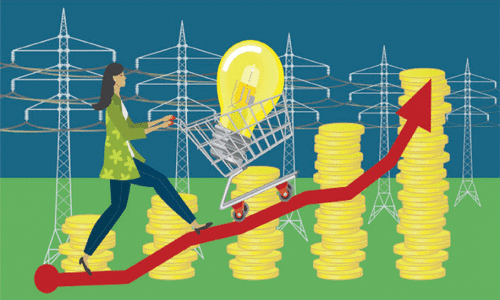Pakistan’s biggest private utility, Hub Power Company Ltd, unveiled on Thursday the premature termination of a pact for the government to buy power from a generation project.
The step comes after Power Minister Awais Leghari told Reuters last month the government was re-negotiating deals with independent power producers (IPPs) to rein in electricity tariffs as households and businesses buckle under soaring energy costs.
The government and market operator, the Central Power Purchasing Agency (CPPA), agreed to settle the company’s outstanding receivables up to October 1, the company told the Pakistan Stock Exchange in a notice.
It said its board approved an accelerated expiry date of October 1 for the deal, instead of an initial date of March 2027, in an action taken “in the greater national interest”.
Separately, the government also reached an agreement with five IPPs to revisit purchase contracts, a move that will save the country Rs60bn ($216.10 million) a year, Prime Minister Shehbaz Sharif said on Thursday.
Chairing the federal cabinet meeting in Islamabad today, PM Shehbaz said: “Five IPPs, with mutual consent and prioritising national interests over personal, […] have reached an agreement on power purchase contracts.
“Today onwards, the ‘take or pay’ [previous contracts] with these five IPPs […] have been completely terminated,” the premier said. He stated that only the outstanding amounts owed to these IPPs would be paid, without any interest.
The move would also provide a benefit of around Rs411bn to the national exchequer, state-run Radio Pakistan quoted PM Shehbaz as saying.
It further said the premier recognised the inputs and support of the allied parties and “especially mentioned Chief of Army Staff General Asim Munir, who took a personal interest in the whole matter”.
According to a Dawn report, at least five IPPs — four developed under the 1994 power policy and one under the 2002 policy — had been asked by a task force backed by the powers that be to “voluntarily” terminate their power purchase agreements (PPAs) without any compensation.
A decade ago, Pakistan approved dozens of private projects by IPPs, financed mostly by foreign lenders, to tackle chronic shortages.
But the deals, featuring incentives such as high guaranteed returns and commitments to pay even for unused power, ultimately resulted in excess capacity after a sustained economic crisis slashed consumption.
Short of funds, the government has built those fixed costs and capacity payments into consumer bills, sparking protests by domestic users and industry bodies.
The need to revisit power deals was a key issue in talks for a critical staff-level pact in July with the International Monetary Fund (IMF) for a $7bn bailout.
Pakistan has begun talks on reprofiling power sector debt owed to China and structural reforms, but progress has been slow. It has also vowed to stop power sector subsidies.
Reducing power tariffs priority: Leghari
Separately, Leghari said that a reduction in power tariffs and the affordable provision of electricity to the people were the government’s top priorities.
Addressing a press conference, the minister said that various measures were being taken to slash electricity prices, adding that electricity prices should fall by Rs10 per unit.
He said agreements with IPPs were mutually being revised and reassessed to this end.
Leghari added that the prime minister set up a National Task Force to bring reforms to the power sector. Five IPPs were identified and negotiations were under way with them, he added.
He said that every section of their agreements was thoroughly studied and an agreement was mutually reached to terminate power purchase agreements with 5 IPPs.
The minister said it would help save around Rs60-70 billion annually, with a cumulative benefit of Rs411bn to the national exchequer.
Leghari appreciated the owners of five IPPs agreeing to terminate their contracts in the national interest and added that the agreement would materialise within the coming days.
He also announced the establishment of the Independent Market Operator System in the power sector. The full-fledged institution is expected to be fully operational in January 2025, he said, adding that it would “not only promote competition but also boost the entire power sector to new heights”.
Moreover, the National Transmission and Dispatch Company (NTDC) is also being fully transformed and the CPPA would have its own role in the sector.
“A comprehensive programme is also being devised to enhance consumption of electricity in winter,” Leghari added.
Reforms are also being introduced in distribution companies by taking all development partners into confidence, he added.
“A visible reduction was witnessed in the losses of Discos in the last three months,” he added.
Leghari expressed hope that power tariffs would be reduced by Rs8-10 per unit within a few months. The minister said the consumption of electricity would increase with the reduction of power tariffs and would also help industry grow.
“New shops and charging stations will be opened to charge electric vehicles and batteries,” he said. “It will also pave the way for more employment opportunities in the country.”
Replying to a question, the minister said that the new agreement would help save billions of rupees for the national exchequer. “Currently, capacity payments will be paid to IPPs but not in future,” he added. “The consumers will purchase electricity from the market like shares.”















































